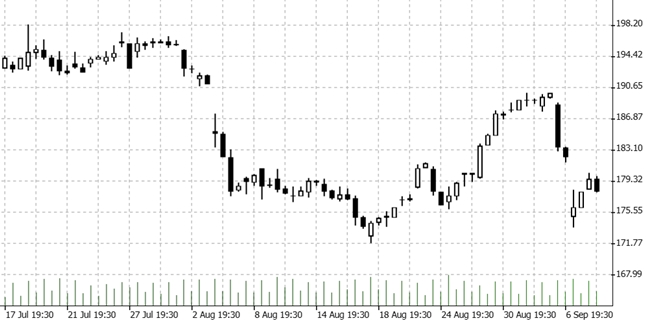Punish one, teach a hundred. This motto, attributed to Mao Zetung, has just been felt by Apple. Beijing is firing warning shots, possibly with the aim of disciplining the White House.

Chance of recovery or beginning of a big crash? We are curious. Here in the view of the four-hour chart. In any case, those who invest in Apple should keep an eye on the news from China. Especially since Apple will soon comment on new products – and perhaps also on the situation in the Chinese empire.
 Source: Bernstein Bank GmbH
Source: Bernstein Bank GmbH
This is what happened: Last week, news had shaken the stock that the Chinese government was banning iPhones in quite a few ministries. The Wall Street Journal reported that Beijing wanted to extend the ban. Some state agencies and companies are also said to have received instructions to stop using Apple smartphones in the future. Bloomberg followed up and reported that the ban could also apply to employees of state-owned companies.
The China Put
Official confirmation from Beijing has been a long time coming. However, a presumed ban would fit into the picture – we are in a cold trade war. The Chinese are currently avoiding foreign products for nationalistic reasons anyway, and are increasingly buying the new smartphone from Huawei instead.
These are all bitter blows for Apple: the group generates about one-fifth of its sales in the People’s Republic, and the communist country is Apple’s third-largest market. Accordingly, the scattered news had an effect: The mega-cap temporarily lost more than 200 billion dollars in stock market value. We think: Beijing has other instruments of torture in store for Apple, such as sabotaging production at Foxconn and Luxshare.
All this probably has a political background. The U.S. has never lifted the sanctions against China imposed by Donald Trump. Whereas the Democrats had criticized this so strongly… Since China apparently supports Russia with weapons technology, Washington under Joe Biden has even imposed new sanctions – against the companies Sinno Electronics and Spacety China, as “Forbes” reported. Huawei is in the Americans’ sights anyway.
China business of the Bidens
This gives the impression that Beijing is angry that the investment in the Biden clan has not paid off. Those who follow the U.S. media – the German editorial offices are looking very strained to the side on this topic – could even get the impression of corruption. In any case, son Hunter Biden once flew to Beijing on Air Force 2 with his dad when he was vice president; he invested in Chinese companies through an investment vehicle called BHR Partners. For example, in Sinopec Marketing – courtesy of high-ranking bigwigs in China, such as the state-controlled Bank of China.
Also active at BHR was Devon Archer, who recently testified as a key witness in Congress that Joe Biden was well aware of his son’s multi-million dollar deals. Also involved in the company was Christopher Heinz, billionaire heir to the ketchup empire and son-in-law of former Secretary of State John Kerry. We recommend researching the machinations of Hunter Biden – not only in China but also in Ukraine at the gas company Burisma – the American Wikipedia (on the German we find unfortunately nothing about it) and the reporting of the “New York Post”, which, by the way, was suppressed on the intervention of the FBI in the social media. We are curious to see whether the Republicans will initiate an impeachment because of this complex of topics.
Our conclusion: Apple seems to be caught in a political battle. With an uncertain outcome. Whether long or short – we wish you successful trades and investments!
_____________________________________________________________________________________________________________________________
The content of this publication is for general information purposes only. In this context, it is neither an individual investment recommendation or advice nor an offer to purchase or sell securities or other financial products. The content in question and all the information contained therein do not in any way replace individual investor- or investment-oriented advice. No reliable forecast or indication for the future is possible with respect to any presentation or information on the present or past performance of the relevant underlying assets. All information and data presented in this publication are based on reliable sources. However, Bernstein Bank does not guarantee that the information and data contained in this publication is up-to-date, correct and complete. Securities traded on the financial markets are subject to price fluctuations. A contract for difference (CFD) is also a financial instrument with leverage effect. Against this backdrop, CFD trading involves a high risk up to the point of total loss and may not be suitable for all investors. Therefore, make sure that you have fully understood all the correlating risks. If necessary, ask for independent advice. CFDs are complex instruments and are associated with the high risk of losing money quickly because of the leverage effect. 68% of retail investor accounts lose money trading CFD with this provider. You should consider whether you understand how CFD work and whether you can afford to take the high risk of losing your money.
